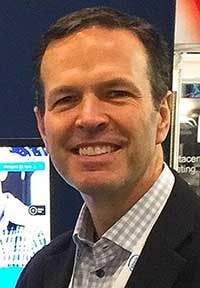Executive Insights: Jeff Klaus from Intel 3Q 2017
The Data Center Frontier Executive Roundtable features insights from industry executives with lengthy experience in the data center industry. Here’s a look at the insights from Jeff Klaus of Intel.
JEFF KLAUS, Intel
As General Manager of General Manager of Intel Data Center Software Solutions, Jeff Klaus leads a global team that designs, builds, sells and supports Intel DCM, the only software that provides real-time, server-level data on the power and thermal conditions across a wide range of data center servers and other equipment. Provided as an SDK, Intel DCM middleware is integrated into Data Center Infrastructure Management (DCIM) consoles to increase data center power and thermal efficiency.
Since joining Intel in 2000, Klaus’ accomplishments have been recognized by multiple division awards. With a broad background in software solutions for the channel, client and SMB space, he has served as Director of Media Programs within Intel’s Digital Home Group, Entertainment Content Marketing Manager, Business Operations Manager, and Software Marketing Manager.
An accomplished speaker, Klaus has presented at such industry forums as Gartner Data Center Summit, AFCOM’s Data Center World, the Green IT Symposium, and the Green Gov conference. He has authored articles on data center power management in Data Center Post, IT Business Edge, Data Center Knowledge, Information Management and Data Centre Management. Klaus currently serves on the Board of Directors for the Green IT Council. Klaus earned his BS in Finance at Boston College and his MBA in Marketing at Boston University.
Here’s the full text of Jeff Klaus’ insights from our Executive Roundtable:
Data Center Frontier: The data center industry has become disciplined in its construction and deployment of capital. In the past year, we’ve seen growing interest from capital providers eager to invest in the sector, while cloud providers are seeking larger and faster builds. What’s your take on how the industry is managing supply, demand and risk?
Jeff Klaus: Cloud is absolutely an area of interest because the growth and business opportunity has been brisk. It’s changing the work we do, the tools we use, and how we ensure reliability and security. Innovations in cloud infrastructure services and customer adoption of microservice architectures offer a level of productivity and flexibility we haven’t had previously.
Investors who understand those trends can help them effectively employ more capital toward providing customer value (instead of infrastructure), and that’s extremely attractive.
Data Center Frontier: Advanced data centers were early adopters of the Internet of Things, using sensors to detect and manage temperature and humidity. What’s the current state of instrumentation in most data centers, and how is that influencing the software decisions that end users are making to manage their IT environments?
Jeff Klaus: IOT inside the datacenter has amassed enough adoption to be considered mainstream. Instrumentation that reports performance, health and operating data is considered a necessity. Most operators are now considering how they combine that information with artificial intelligence to drive faster decisions or identify potential interconnected data points.
For a while, I suspect that combination of data and analysis will be in an advisory role to the operator… who will be making the final decisions…
Going further, future discussion will be around the types of algorithms that work best for data center operations, and how to manage the analysis done in generating the decisions.
Data Center Frontier: Everyone is talking about the edge and the potential for a more distributed infrastructure, but there seem to be many definitions of its location. What do you see as the most promising opportunities in edge computing, in terms of location, form factor and timing?
Jeff Klaus: FPGA technologies are enabling this area. Its flexibility will help handle unique data at the source and can provide an area of innovation and new services.
Editor’s note: FPGAs (field programmable gate arrays) are semiconductors that can be reprogrammed to perform specialized computing tasks. FPGAs allow users to tailor compute power to specific workloads or applications.
Data Center Frontier: It appears that a dwindling number of users are building new corporate data centers, with most new workloads shifting to cloud or colo environments. What’s your take on this transition, and what will it mean for legacy corporate data centers? Do these facilities have a future as candidates for retrofit or repurposing?
Jeff Klaus: We haven’t hit the wall on data center demand yet. Service providers are making their environments more flexible (so they can deploy to cloud and scale out), but security still has a need to drive data on premise, and most HPC is still run on premise.
We may experience lower demand at some point, but the virtuous cycle of data demand and growth that is still driving buildout.
See the entire Data Center Frontier Executive Roundtable for insights from additional executives and topical stories on the latest data center trends.
